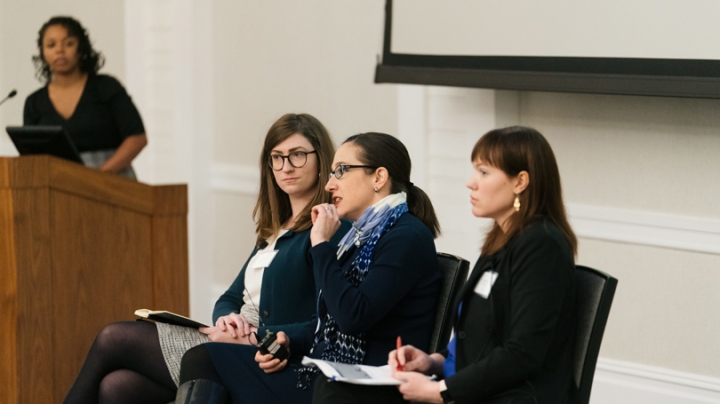This week, Dartmouth hosted three representatives from the National Academies of Sciences, Engineering, and Medicine (NASEM) to discuss the findings of the academies’ 2018 landmark report, “Sexual Harassment of Women: Climate, Culture, and Consequences in Academic Sciences, Engineering, and Medicine.”
That report’s recommendations form the basis of Dartmouth’s Campus Climate and Culture Initiative (C3I), which addresses sexual harassment and the abuse of power on campus. And in 2019, Dartmouth, along with 40 other colleges and universities, joined an action collaborative with NASEM to bring together academic leaders and other key stakeholders to work to prevent sexual harassment across higher education.
During their visit, the NASEM representatives—Arielle Baker, Guarini ’19, an associate program officer with NASEM’s Committee on Women in Science, Engineering, and Mathematics; Frazier Benya, the senior program officer on the committee; and Lilia Cortina, a professor of psychology, women’s studies, and management at the University of Michigan—met with faculty, administrators, postdoctoral fellows, students, and staff across campus to discuss how the action collaborative is developing evidence-based policies and practices for addressing and preventing all forms of sexual harassment.
“This is an incredibly important topic for the success and excellence of our community,” President Philip J. Hanlon ’77 told a group of about 150 members of the Dartmouth community who gathered Monday afternoon in the Hanover Inn to hear Baker, Benya, and Cortina present the report’s findings and recommendations. Hanlon said the NASEM report is a landmark study of the prevalence, causes, and impact of sexual and gender harassment in academia.
Introducing the speakers, Provost Joseph Helble said, “It’s important for us to see ourselves as a community—one that welcomes every member of the community, and that’s every member.” This, he said, is why Dartmouth is proud to have joined the action collaborative and to be the first higher education institution to launch an initiative—C3I—designed to apply the report’s recommendations.
In their presentation, Baker, Benya, and Cortina summarized the report’s findings and recommendations and described the work of the action collaborative to raise awareness, share evidence-based policies, conduct research, and develop standards for measuring progress toward reducing and preventing sexual harassment in higher education. The full report is available online.
During a question and answer period, the three women talked about the difference between sex discrimination and harassment; the efficacy of using restorative justice methods in sexual and gender harassment cases; how to apply the report’s findings and recommendations to genderqueer and nonbinary people; programs for improving civility in the workplace; and the role of online reporting in giving people who are the targets of harassment greater flexibility in how and when they report.
Finally, the presenters, along with C3I Director Theodosia Cook, led the audience in a small-group exercise discussing what Dartmouth is doing well around these issues, what it could do better, and what it could be doing that it isn’t yet.
Cook also made a plug for the new C3I Ambassador Program, a yearlong commitment that will train a cohort of faculty and staff members to facilitate trainings and conversations on the impact of gender bias within their individual departments. Applications for the ambassador program are due Friday, Jan. 17.
In addition to the large-group meeting, Baker, Benya and Cortina held a lunch meeting with undergraduates on Monday, a breakfast with graduate students on Tuesday, and were available by appointment throughout their visit to meet with individuals to discuss the NASEM report, the action collaborative, and research on sexual harassment.
C3I is one of three initiatives the College has started in recent years to improve campus climate, along with Moving Dartmouth Forward, an effort to prevent high-risk behavior, and Inclusive Excellence, which is strengthening the College’s work to increase diversity, equity, and inclusivity.
Hannah Silverstein can be reached at hannah.silverstein@dartmouth.edu.


